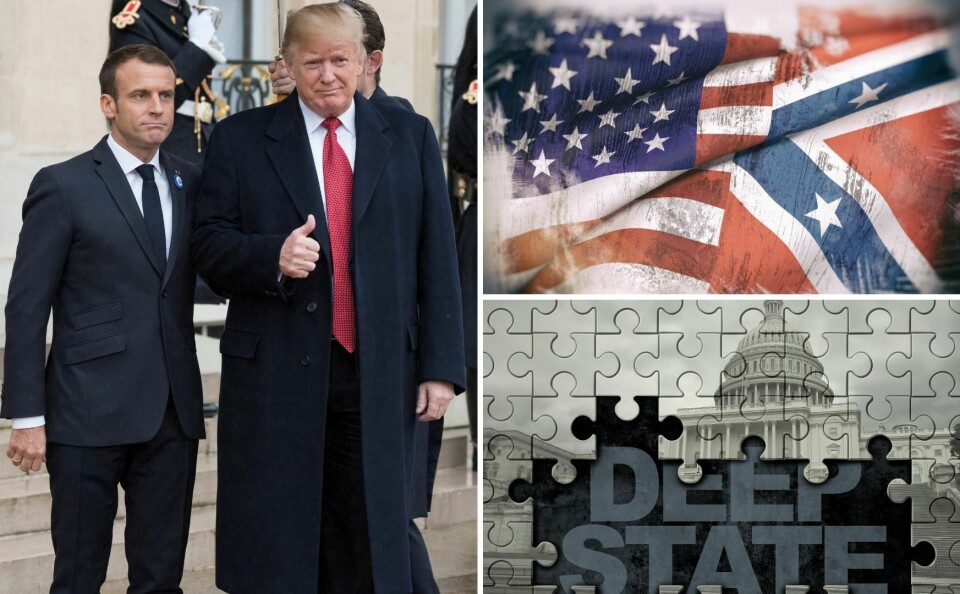-
British firefighter barred from dream navy job tells of disappointment
'I don’t see what makes me different from my friends' says 23-year-old turned down for French citizenship
-
Loire vineyard invites Taylor Swift to visit after documentary cameo
Disney+ documentary puts family vineyard in the international spotlight
-
39 bombs wash up on Gironde beach following World War Two bunker collapse
Shells were defused by experts but prefects warn others may remain
Does Macron's use of the word sécession have US Civil War overtones?
A civil war, or immigrants ‘splitting’ from France? We ask Vincent Bernard, a French historian and US Civil War expert, to shed light on this distinctive word

President Emmanuel Macron this week used the word sécession to describe immigrants who do not abide by France's republican laws.
Mr Macron made the word his own, after taking on the journalist’s wording in one of the many questions asked in an interview withLe Point this week.
Read more: France must significantly reduce immigration, says Macron
“People who are the most 'en sécession' (seceding, or splitting from) with our values are often born in France,” said Mr Macron, when discussing the issue of France’s immigrant integration policies.
In general, Mr Macron tends to refer to members of the Muslim community more than any other when discussing a lack of integration. The president added to his argument by mentioning the law on separatism, which is intended to condemn any group, person or association that does not follow the core principles of the French Republic.
In the case of religious beliefs and practices, this concerns the French principle of laicité (secularism).
An intentional borrowing of US connotations?
The word ‘sécession’ has, however, strong connotations in France. It almost always refers to the American Civil War, which French historians call la Guerre de Sécession.
But this is not the first time that the French president has appeared to borrow from American vocabulary to comment on aspects of French society.
The Connexion asked Vincent Bernard, a French historian who has written several books on the American Civil War, about the meanings behind the different terms.
‘Civil is an emotional term of identity’
“[The term] ‘Civil War’ is a more of an emotional choice that is part of the United States’ identity,” said Mr Bernard, adding that the term took years to be used consistently among even American historians.
In fact, historians in the US themselves disagreed over what the war should be called, largely due to their own loyalties and identity politics.
Members of the Confederate States - the old South - avoided the term Civil War as much as possible, choosing instead terms such as ‘War of Separation’, ‘War for Southern Independence’, or ‘War of Northern Aggression’.
“The South saw it as a war of aggression while the North saw it as a war of rebellion,” said Mr Bernard.
It was only around the early 20th century that the word Civil imposed itself, mainly because it seemed to declare the United States as a one and indivisible nation, said Mr Bernard. The choice of word also aligns with a view of the US as a “one and indivisible” nation, he said.
“On the other hand, the word sécession suggests there is an uncertainty about the end result,” said Mr Bernard.
The word means to ‘split from’ but does not, as the word ‘civil’ suggests, denote a unified ending.
“French historians have always chosen Guerre de Sécession,” he said. “It does not seem inaccurate to me.”
Sécession refers to the Civil War
In fact, many French people only employ the word sécession when referring to the American Civil War. Many do not even realise or know that the word does not translate in the same way in American English.
The word is almost always used purely in association with what would be called the Civil War in US English, making Mr Macron’s use of the word even more intriguing.
Even the Académie française, France’s authority on the French language, translated ‘American Civil War’ directly into ‘La Guerre de Sécession aux États-Unis’ in the eighth edition of its dictionary, published in 1932.
It reads: “La guerre de sécession aux États-Unis dura quatre ans (The American Civil War lasted for four years).”
All this is to say that it is not 100% clear whether Mr Macron is using the word sécession to suggest that France is in a state of civil war, or in a state of ‘separation’ with parts of the immigrant population.
His meaning appears open to interpretation.
French Deep State
This would not be the first time that Mr Macron has applied American terms and concepts to describe or convey ideas in French politics.
He has twice mentioned the existence of an Etat profond (Deep State) within the French administration.
The term is often associated with former President Donald Trump, who used it to denounce the existence of administrative clerks ‘working deviously’ (as he saw it) against his policies.
Mr Macron used it in a more-or-less similar way when he accused French ambassadors of working against his aims to establish closer ties with Russia, as revealed by newspaper L’Opinion in August 2019.
Mr Macron is also a defender of ‘nudge’, a concept of behavioural economics often associated to liberal paternalism (in which policies and environments are deliberately set up to encourage certain behaviours, sometimes without people even realising).
Journalist Audrey Chabal revealed in the book “Souriez, vous êtes nudgé” (Smile, you are being nudged, Editions Faubourg, 2021) that Mr Macron is an extensive user of ‘nudge economics’.
Read also
Macron’s imaginary ‘average Jojo’ spells disaster for France
New report reveals cost of Brigitte Macron to the French state
























